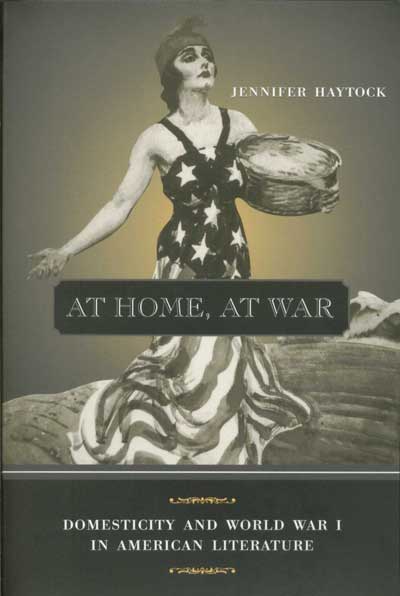At Home, At WarDomesticity and World War I in American LiteratureJennifer Haytock |
 6/24/2003 200 pp. 6x9  $39.95 paper 978-0-8142-5111-9 Add paper to shopping cart Shopping Cart Instructions Review/Change Shopping Cart & Check-out | |||
|
“The manuscript’s synthesis of the rhetoric of propaganda, historical narratives, and literary analysis represents the best kind of scholarship being done in literary analysis and cultural studies today. Her close reading of the literary texts offers ample evidence for the literary scholar while her more general conclusions about gender, war, the home and the ideologies that govern them would make her study relevant to scholars outside the field of literary studies as well. A remarkably readable book that is particularly apt for these times.” —Dianne Chambers, Elmhurst College “A thought-provoking and informative book that is bound to become and important work of literary criticism. At Home, At War fills a void in scholarship for this period in American Literary history and deserves a wide audience.” —Marilyn Elkins, California State University–Los Angeles This study demonstrates that such literary divisions as war novel and domestic novel limit readers’ understanding of the ways these categories rely on and respond to each other. Haytock argues that gender creates an ideological context through which both domesticity and war are viewed and understood; issues of home and violence are intricately related for U.S. authors who wrote about the First World War. Haytock explores what war and domestic texts represent in light of the deconstructionist and feminist project of re-reading: seeing what is said in its cultural and historical context and seeing what is not said. Readers take food, shelter, and clothing for granted, and yet the way we treat them is part of what allows us to define ourselves as “civilized.” In war novels and domestic novels by Temple Bailey, Ellen Glasgow, Edith Wharton, Willa Cather, John Dos Passos, Thomas Boyd, Ernest Hemingway, William Faulkner, and Eudora Welty, the idea of home and domestic rituals contribute to the creation of war propaganda, the soldier’s experience of war, and the home front’s ability to confront the war after the fact. This approach helps literary criticism reject the separation of men’s and women’s writing, particularly but not only their writing about war. Jennifer Haytock is assistant professor of English at the
University of Illinois, Springfield. | ||||

